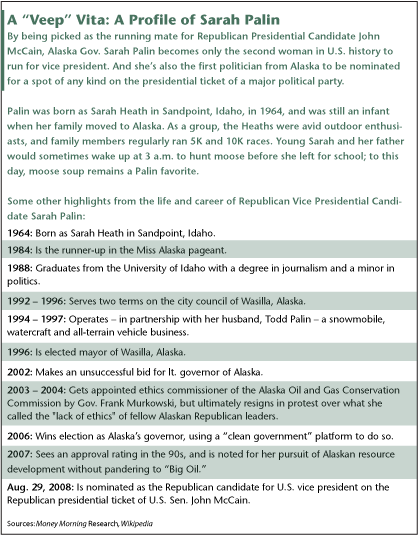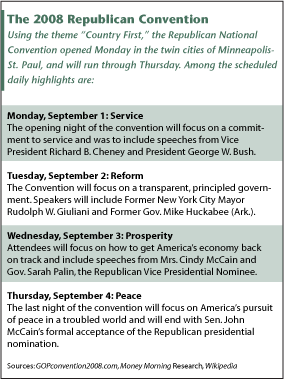Election 2008: A McCain Victory Impact on US Economy
ElectionOracle / US Presidential Election Sep 03, 2008 - 04:59 PM GMTBy: Money_Morning
 Martin Hutchinson writes: One thing is clear about John McCain's economic policies: They won't be a mere continuation of George W. Bush's policies. They can't afford to be. While Bush's tax cuts have been highly beneficial both to the stock market and to investors directly, the Bush Administration has taken what was a $150 billion federal budget surplus and transformed it into a $400-billion-plus deficit. That's at a time when stock markets and real estate markets have been ebullient, producing lots of bonuses and capital gains to tax.
Martin Hutchinson writes: One thing is clear about John McCain's economic policies: They won't be a mere continuation of George W. Bush's policies. They can't afford to be. While Bush's tax cuts have been highly beneficial both to the stock market and to investors directly, the Bush Administration has taken what was a $150 billion federal budget surplus and transformed it into a $400-billion-plus deficit. That's at a time when stock markets and real estate markets have been ebullient, producing lots of bonuses and capital gains to tax.
Most of the deficit increase has resulted from sloppiness on spending; only about one third of the negative swing has been caused by the Bush tax cuts. Some of those cuts – most notably the 2003 cut in dividend taxes – almost certainly improved the economy enough to pay for themselves. Indeed, the 2003 dividend tax cut alone raised the theoretical value of the U.S. stock market about 10%, putting an end to a dangerously depressing downdraft after the 2000 tech bubble.
If a recession hits, the federal budget deficit is likely to hit $1 trillion, which will be very difficult to finance, forcing up interest rates, weakening the dollar and tending to “crowd out” the private investment that makes the economy grow . In addition, the current surplus on Social Security is likely to turn into a deficit by 2018, the point at which about half the baby boomers will have retired. The “bankruptcy of the trust fund” in 2041 or so isn't a looming catastrophe, because the trust fund is just a bunch of government debt – the left hand lending to the right. Thus, the trust fund's bankruptcy means either that Social Security will have to become self-financing (reducing real benefits by about 26% – to around their present level) or taxes will have to be raised. Leave that one to our grandchildren: The important lesson is that Social Security, which has provided more than $100 billion annually to make our budgeting easier since the 1980s, will shortly stop doing so.
The bottom line is that either presidential candidate will have to raise taxes. Democratic candidate Barack Obama will raise them because he wants to (or rather, because he has some “exciting” spending ideas that will require it) and McCain will raise them because he wants to keep the budget within shouting distance of a balanced position. Although McCain has suggested some tax cuts, on that suggested the elimination of the gas tax during the summer period, that proposal was met with universal derision by economists (because it benefit would go entirely to Saudi Arabia and other oil producers). Indeed it suggested that economics was not McCain's strong suit or greatest interest. In any case, only draconian public spending cuts would save the necessity for substantial tax increases, and those did not seem likely from either candidate.
McCain's selection of Alaska Gov. Sarah Palin as his running mate late last week, changes the position somewhat. There in Alaska, Palin has a tough reputation as a fighter against government waste. As McCain's vice president, Palin would constitutionally have the responsibility to act as president of the Senate. Is it too much to hope that, whichever party controls Congress, Palin will be at least modestly effective in reducing the orgy of earmarked spending, agricultural subsidies, ethanol subsidies and other wasteful public spending that damages the economy and benefits only a few favored lobbyists?
Lower public spending would allow for modestly lower taxes: McCain has promised to keep dividend and capital gains tax rates at their current levels, and to eliminate the estate tax. Investors can at least hope that a combination of Palin, Republican fiscal doctrine and McCain's self interest will push the political system towards modest tax cuts, or at least away from tax increases such as the draconian raises in capital gains or dividend taxes that would damage investors both directly in their pockets and indirectly through declines in stock values.
Palin's other influence is likely to be in the energy area. McCain has gradually, under huge pressure from his Republican supporters due to high oil prices, been moving from his previous opposition to drilling in the offshore Continental Shelf and Alaska's Arctic National Wildlife Reserve . Currently, he favors offshore drilling, but not drilling in ANWR.
McCain also favors a very expensive “cap-and-trade” approach to the global warming problem, which involves a new bureaucracy figuring out what each major carbon emitter should be permitted to emit, and allocating permits accordingly, without charge. Obama's equivalent scheme, which involves auctioning the permits, has two virtues: It leaves the allocation of permits to the free market rather than a government bureaucracy and it produces revenue for the federal government, which can be used to cut other taxes.
Palin is a breath of fresh air on the whole subject. She remains unconvinced that mankind has any significant effect on global climate, and like most Alaskans believes that oil drilling in ANWR and elsewhere represents the economic future of her state. How far she will manage to convince McCain of her position is doubtful, but her access to the ticket should mean at least more oil drilling and a less draconian cap-and-trade system than would otherwise be the case.

A further advantage of a McCain presidency could be the conclusion of more trade deals, and the consequent expansion of both world trade and of the economy in general. McCain is even more of a free trader than President Bush and has more credibility abroad; hence, it must be possible that he could make progress on the Doha Round of trade negotiations . That would be particularly important for the economies of emerging markets, which would be given greater access to the U.S. market, and reap rewards in the form of economic growth and corporate profits.
There are two areas where McCain is less good news for investors and the U.S. economy than Obama. One is monetary policy. Obama is advised by former “tight money” Federal Reserve Chairman Paul Volcker , and hence understands the inflation-fighting benefits of higher interest rates. He will also want to make a change at the Fed, where the Democrats have not appointed a chairman since Volcker himself in 1979.
Conversely, McCain will be more likely to extend the term of current Fed Chairman Ben S. Bernanke (which expires in January 2010), thereby producing an additional extended period of excessively low interest rates. While beneficial for the stock market in the short run, low interest rates in the current environment will produce accelerating inflation, which will require a much more seriously damaging period of much higher interest rates to sort out. Low rates also will accelerate the process of outsourcing U.S. industry to low-wage countries, which do not suffer their normal “cost of capital” disadvantage when global money is cheap.
The other downside is in security policy. McCain is likely to keep troops in Iraq longer than Obama, and is more likely to engage in military operations elsewhere (though under either candidate some step-up in Afghanistan seems probable). That costs money, increases the budget deficit (or raises taxes) and leads to slower economic growth and higher inflation over the long term.

A McCain presidency would be good for defense stocks, as defense spending would be higher. It would be good for the large, patented pharmaceutical stocks, as they would not be subjected to price controls as the Democrats currently propose. It would also be very good for domestic oil companies, which would expand their operations in offshore oil, unconventional oil sources such as shale and possible drilling in ANWR. It might also be good for “new energy” companies, although it is less clear than with Obama where a McCain/Palin administration might end up on that issue.
[Editor's Note : Money Morning Contributing Editor Martin Hutchinson has personally interviewed the economic advisors for candidates McCain, Obama and Edwards, and very early on concluded that Obama and McCain would be the best candidates for investors. For a full report on the " presidential profit plays ," please click here. The report is free of charge.]
News and Related Story Links :
- Money Morning Election Analysis Series : Election 2008: Dawning of Democratic Convention Illuminates a Few Bright Spots For Investors .
- Agora Financial Inc : IOUSA – The Movie .
- Wikipedia : Sarah Palin .
- Wikipedia : Arctic National Wildlife Refuge .
- Money Morning Economic Analysis: Doha Discussions Could Take Another Seven Years .
- Wikipedia : Paul A. Volcker . Election 2008: Obama or McCain – U.S. May Suffer Either Way .
- Money Morning Election Series : Election 2008: The Achilles' Heel of Obamanomics .
- Money Morning Election Series : Election 2008: Why Poor Presidential Approval Ratings Make For Great Stock Markets .
- Money Morning Election Series: Election 2008: As Democratic Primary Hits a New Pinnacle Today, Obamanomics Emerges as Clear Front-Runner for Investors .
- Money Morning Election Series : The Six Profit Plays to Consider as “Super Tuesday” Plays Out .
By Martin Hutchinson
Contributing Editor
Money Morning/The Money Map Report
©2008 Monument Street Publishing. All Rights Reserved. Protected by copyright laws of the United States and international treaties. Any reproduction, copying, or redistribution (electronic or otherwise, including on the world wide web), of content from this website, in whole or in part, is strictly prohibited without the express written permission of Monument Street Publishing. 105 West Monument Street, Baltimore MD 21201, Email: customerservice@moneymorning.com
Disclaimer: Nothing published by Money Morning should be considered personalized investment advice. Although our employees may answer your general customer service questions, they are not licensed under securities laws to address your particular investment situation. No communication by our employees to you should be deemed as personalized investment advice. We expressly forbid our writers from having a financial interest in any security recommended to our readers. All of our employees and agents must wait 24 hours after on-line publication, or 72 hours after the mailing of printed-only publication prior to following an initial recommendation. Any investments recommended by Money Morning should be made only after consulting with your investment advisor and only after reviewing the prospectus or financial statements of the company.
Money Morning Archive |
© 2005-2022 http://www.MarketOracle.co.uk - The Market Oracle is a FREE Daily Financial Markets Analysis & Forecasting online publication.


